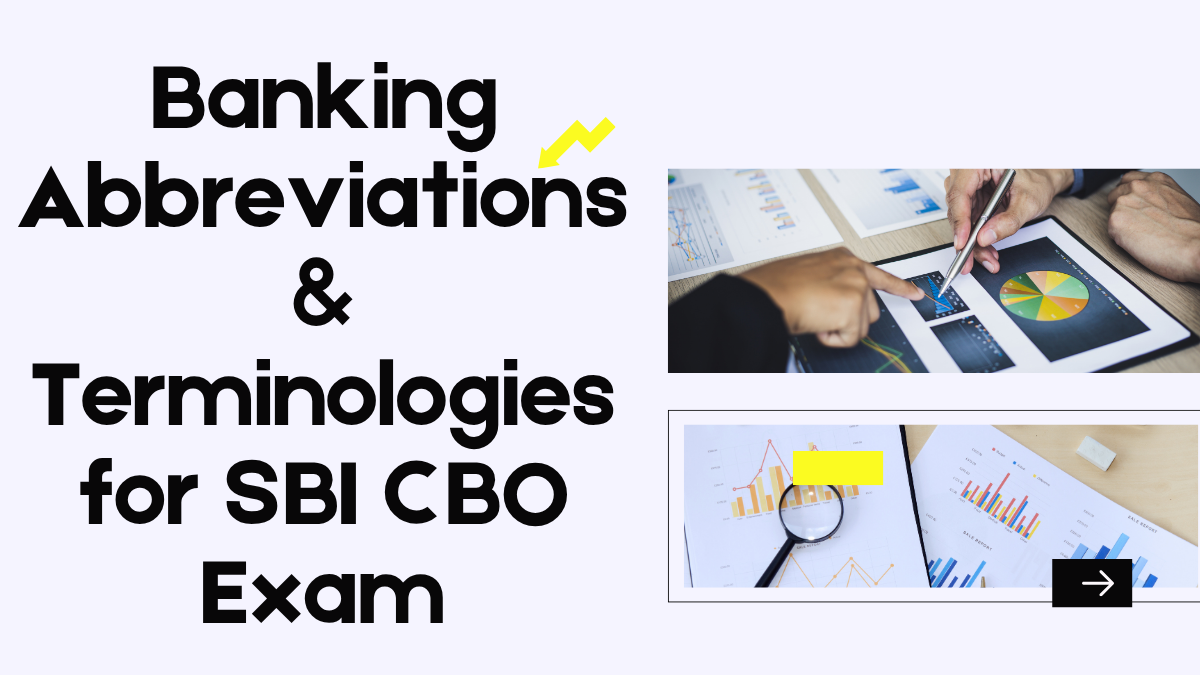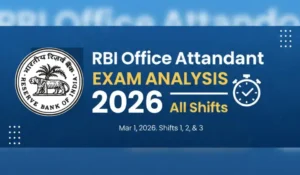The SBI Circle Based Officer (CBO) Exam 2025, expected to be held in July, puts a strong focus on candidates’ understanding of essential banking terms and frequently used abbreviations. A solid grasp of banking vocabulary showcases a candidate’s preparedness for the role and reflects their awareness of the industry’s professional language and practices.
Banking Abbreviations and Terminologies for SBI CBO Exam 2025
In the SBI CBO Exam 2025 exam, Banking Knowledge holds considerable importance and can influence overall performance in both the objective and descriptive sections. Candidates aiming for success must develop a clear understanding of key banking abbreviations and industry-related terms, as these frequently appear in exams and real-world banking scenarios. In the modern banking sector, such terminology is widely used in internal communications, official memos, and regulatory documents. Below is a guide to help you strengthen this area.
Banking Abbreviations for SBI CBO 2025
Below is a curated list of important abbreviations that candidates must be well-versed in:
| Banking Abbreviations for SBI CBO 2025 | ||
| Abbreviation | Full Form | Usage/Meaning |
| RBI | Reserve Bank of India | India’s central banking institution |
| SBI | State Bank of India | Largest public sector bank in India |
| NEFT | National Electronic Funds Transfer | Electronic funds transfer system |
| RTGS | Real Time Gross Settlement | Instant large-value fund transfer system |
| IMPS | Immediate Payment Service | Real-time interbank electronic fund transfer |
| NPA | Non-Performing Asset | Loan or advance in default or arrears |
| CASA | Current Account Savings Account | Low-cost deposit accounts for banks |
| CRR | Cash Reserve Ratio | The percentage of deposits that banks must keep with the RBI |
| SLR | Statutory Liquidity Ratio | The percentage of deposits that banks must keep in liquid assets |
| KYC | Know Your Customer | Customer identification process |
| IFSC | Indian Financial System Code | Unique code for bank branches |
| MICR | Magnetic Ink Character Recognition | Code for processing cheques |
| ATM | Automated Teller Machine | Self-service banking terminal |
| ECS | Electronic Clearing Service | Bulk payment/receipt system |
| FD | Fixed Deposit | Term deposit in a bank |
| OD | Overdraft | Facility to withdraw more than the account balance |
| EMI | Equated Monthly Instalment | Fixed payment for loans |
| BC | Business Correspondent | Bank agent for outreach in rural areas |
| PSL | Priority Sector Lending | Loans to sectors identified as priority by the RBI |
| NBFC | Non-Banking Financial Company | Financial firm not holding a banking license |
| UPI | Unified Payments Interface | Real-time payment system |
| SARFAESI | Securitisation and Reconstruction of Financial Assets and Enforcement of Security Interest | SARFAESI Act, 2002- allows banks and financial institutions to recover non-performing assets (NPAs) |
| MSME | Micro, Small & Medium Enterprises | Businesses that are classified based on their Assets & Turnover |
| FRA | Forward Rate Agreement | An interest rate derivative |
| BASEL III | Basel Accord for international banking regulation | Internationally agreed-upon standards for bank regulation and supervision |
| CIBIL | Credit Information Bureau (India) Limited | Maintains records of individuals’ and organisations’ credit-related activities |
| GST | Goods and Services Tax | Indirect tax imposed on the supply of goods and services |
| IPO | Initial Public Offering | The company goes public for the first time by offering shares to investors |
| FDI | Foreign Direct Investment | Investment made by a company or individual from another country |
| NABARD | National Bank for Agriculture and Rural Development | Development bank that focuses on promoting agriculture and rural development |
Banking Terminologies for SBI CBO 2025
Along with abbreviations, understanding the meanings and implications of core banking terms is essential. Below are some frequently used banking terminologies likely to be asked in SBI CBO 2025:
- Repo Rate: The rate at which the RBI lends money to commercial banks. Used to control liquidity in the economy.
- Reverse Repo Rate: The rate at which the RBI borrows money from commercial banks.
- Bank Rate: The rate at which the RBI lends money to commercial banks without any security.
- Cheque Truncation: Process of stopping the physical movement of cheques and using scanned images for clearance.
- SWIFT: Society for Worldwide Interbank Financial Telecommunication, a network for international financial messaging.
- Moratorium: Temporary suspension of loan repayment.
- Credit Rating: Assessment of a borrower’s creditworthiness.
- Digital Banking: Banking services are delivered through digital channels like mobile apps and internet banking.
- Core Banking Solutions (CBS): Networking of bank branches to enable customers to operate their accounts from any branch.
- Letter of Credit (LC): A guarantee from a bank assuring that a buyer’s payment to a seller will be received on time.
- Balance Sheet: A financial statement showing the assets, liabilities, and equity of a bank at a specific point in time.
- Amortisation: The gradual repayment of a loan in instalments.
- Capital Adequacy Ratio (CAR): A measure of a bank’s capital in relation to its risk-weighted assets.
- Securitisation: The process of converting illiquid assets into tradable securities.
- Overdraft: A facility allowing an account holder to withdraw more than their account balance.
- Bancassurance: A partnership between a bank and an insurance company allowing insurance products to be sold through bank branches.
Why Banking Abbreviations and Terminologies Matter
The SBI CBO exam tests these to assess whether the candidate is comfortable with day-to-day banking operations and regulatory terms. Learning them thoroughly enhances your grasp of financial concepts and helps in decoding questions quickly in both objective and descriptive sections.
- The SBI CBO exam tests practical banking knowledge, including the use of industry-specific terms and short forms.
- Understanding these terms helps in answering direct questions, interpreting case studies, and writing essays or letters in the descriptive section.
- Proficiency in banking language is also crucial for interviews and on-the-job communication.
How to Prepare for Banking Abbreviations and Terms
To prepare for this part of the SBI CBO exam, candidates should:
- Revise official banking circulars, RBI notifications, and annual reports.
- Practice quizzes are specifically focused on abbreviations and definitions.
- Create flashcards or digital notes for daily revision.
- Use mock tests that simulate the exact exam pattern.




 Daily Current Affairs Quiz 1st March 202...
Daily Current Affairs Quiz 1st March 202...
 RBI Office Attendant Exam Analysis 2026,...
RBI Office Attendant Exam Analysis 2026,...
 Daily Current Affairs and GK Updates (28...
Daily Current Affairs and GK Updates (28...








